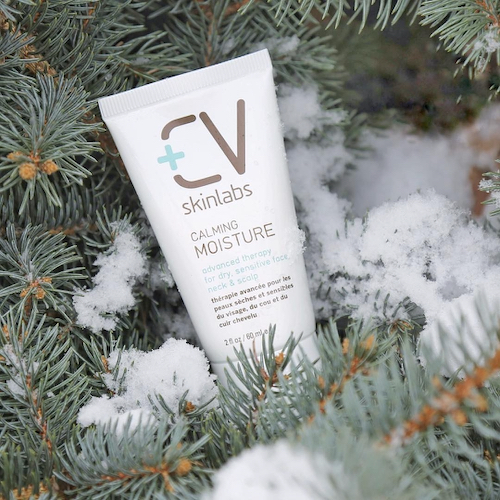
Could an icy cold plunge help you start the year off with radiant skin?
It may not sound particularly cozy at this time of year, but you may be surprised at how much a few moments in ice-cold water could benefit not only your skin but your mental health too!
What is a Cold Plunge?
Officially, a cold plunge is when you fully submerge your body up to your neck in water below 59 degrees Fahrenheit.
You can do this in several ways. The easiest is to create an ice bath in your own home. Fill the tub about halfway with cold water, pour in one to three bags of ice to reach a temperature of 50-59 degrees, then ease in slowly. You can also try a cold shower, though it’s harder to determine the temperature.
Then there are official cold plunge tubs sold at retailers that claim to provide health benefits. Professionally made tubs like those from The Cold Plunge, Polar Monkeys, and Ice Barrel come equipped with everything you’ll need.
There are even cold-plunge centers around the country now that offer the “service” of cold plunges. Wellness spas like Breath Degrees in La Costa, California have cold-plunging tanks you can use.
Of course, if you live near the water, you have the option of taking a dip in the cold stream or lake, but make sure you take all appropriate safety precautions.
Are There Real Health Benefits to a Cold Plunge?
We have very few studies on the potential benefits of cold plunging and there is plenty of skepticism among healthcare providers. But cold water immersion has its roots in many different cultures and has been used for centuries as a way to ease pain and feel better.
We’ve listed some of the studies that have been done below, along with their positive results. These studies were small, so we need more research to be sure about the results, but they suggest that cold plunges may help boost mood, energy, and overall well-being.
7 Benefits of a Cold Plunge
1. Eases Tension and Fatigue
In one study of 49 Finnish winter swimmers who dipped in cold water an average of four times a week, participants reported feeling a significant decrease in tension and fatigue after four months, as well as an increase in energy. The ones who suffered from rheumatic diseases like arthritis and fibromyalgia also reported pain relief.
Exposing your body to cold temperatures for short periods can increase the secretion of certain hormones that are involved in regulating attention, focus, and energy, helping you feel an energy boost.
2. Boosts Mood
In the study above, participants also reported that the cold plunges helped improve mood and general well-being.
In a different study, researchers had 64 undergraduate students complete a mood questionnaire. The following week, 42 of them completed up to a 20-minute immersion in cold seawater. Twenty-two acted as controls. They then completed the mood questionnaires again.
The results showed that the cold-water immersion group experienced a significant boost in mood—15 points on the questionnaire scale—compared to only 2 points in the control group. They enjoyed improvements in vigor and self-esteem, and reductions in tension, anger, depression, and fatigue.
“Cold-water immersion is a well-tolerated therapy that is capable of significantly improving mood in young, fit, and healthy individuals,” the researchers wrote.
3. May Strengthen Immune System
Regular exposure to cold water may help strengthen the immune system. In a late 1990s study, researchers found that cold water immersion three times a week for six weeks created a small, but significant, increase in several immune cells.
The researchers wrote that the stress-inducing stimuli “activated the immune system to a slight extent.”
In a more recent 2016 study, researchers found that participants who took a hot-to-cold shower for 30 consecutive days reduced their workplace absences due to sickness by 29 percent. (The participants ended their showers with cold water for 30 to 90 seconds.)
4. May Boost Antioxidant Protection
We get many healthy antioxidants in our diets from fruits and vegetables, but we also have some that the body produces on its own. One of these is glutathione. It is produced by the liver and is essential for building and repairing tissues, protecting from free radical damage, and for the immune system’s proper functioning.
In a small study of 10 healthy subjects who regularly swam in ice-cold water during the winter (winter swimmers), researchers found that glutathione levels increased compared to nonwinter swimmers. The researchers noted this could help increase the body’s tolerance to stress and diseases.
5. May Relieve Muscle and Joint Soreness
You’re familiar with using ice packs to soothe sore muscles. A cold plunge may have a similar effect, potentially reducing muscle soreness after a workout or injury. The cold water restricts blood vessels, which helps to ease inflammation.
Submerging yourself in cold water can also numb the nerves around your joints and muscles, which stimulates the release of hormones and endorphins that can help relieve inflammation and ease muscle and joint pain.
In one 2017 study, researchers found that arthritis patients who volunteered for a whole-body cold mist shower during a one-week period experienced less pain and better sleep quality. The researchers noted that the whole-body cold treatment method “may offer a safe option for self-treatment of pain at home…”
6. Improves Blood Flow
Regular cold water immersion can help improve blood flow after you get out of the cold water. This is one of the reasons why you may have facial flushing or why your skin can look fresh after a cold plunge.
While you’re in the cold water, the blood vessels constrict, but once you get out, they open again, allowing the blood to rush to where it’s needed. In a 2020 study, researchers showed this effect on men who performed endurance training for four weeks. The cold therapy increased blood flow compared to a control treatment.
7. Improves Skin’s Appearance
You may already be using cold water to refresh your skin when you splash cold water on your face. When you feel that tingle and know that the water is doing its job.
You can get even better results from a cold end to your shower or with a cold plunge. As noted above, the blood vessels in the skin will constrict, but when you get out of the cold water, they will dilate again and the skin will be more oxygenated than before.
This can create a natural glow in the skin while potentially decreasing inflammation. The result is an overall more radiant, smooth look.
Skin conditions like eczema may also benefit from cold plunges. The cold water helps ease itchiness without stripping the natural oils from the skin like warm or hot water does. So the skin feels better without drying out.
Just don’t forget to apply your moisturizer afterward!
Have you tried a cold plunge?



